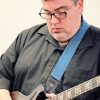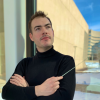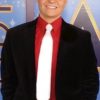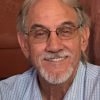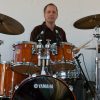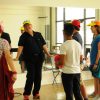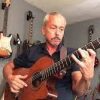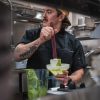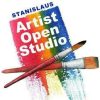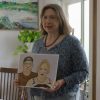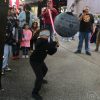Music is back, and the people that make it are so ready to perform. Over the last few months, our live music scene has been getting back on its feet. Now with the mask guidelines reduced, there may be more opportunity to gather and party. Over the last two years, people have learned how to play, home concerts and web casts. Now it is time to get out on stage, tune up the guitars and do some rockin’!
Music is so important. Live music is creative, making music is amazing and it makes our brains work in cool ways. That’s why music in the schools is so very important and it’s why music lessons are always a good idea.
Modesto is a live music city and we are fortunate to have two “Schools of Rock” many music stores where they give lessons and a lot of experienced former rockers that all work together to keep our community fed with some great rock and roll, classical, jazz, blues, hip hop, bluegrass, country and so much more.
The ever intrepid Middagh Goodwin connected with many of our local music teachers to see what makes them teach music and how it impacts our community.
Darin Morris – Valley Music Institute
Wayland Whitney – Conductor Modesto Symphony Youth Orchestra
Roy Stevens – General Director Opera Modesto
Dave Dow – Modesto Junior College
Gordon Kennedy – GK Music
William Melendez – Music Director Norman Glick Middle School
Dave Hawkes – VMI, GK Music, Hendrickson’s Music
Carina Ibarra – Stanislaus Union School District
Chris McPherson – Downey High Theatre
What do you feel is the importance of and benefits from music education?
Wayland Whitney MSYO: Music performance is highly demanding for our brains. A musician must simultaneously read, listen (both to themselves and the group), prepare, and react, while also trying to elicit an emotional response from an audience. I know of no other human activity that combines this refined athleticism and intellectualism with self-expression; these are necessities of
Roy Stevens Opera Modesto: Music Education in its many forms has the potential to inspire, develop and inform in unexpected ways: Developing self-esteem and self-confidence, learning teamwork in a non-competitive context, developing listening and focus skills, developing study skills. It is also fun, satisfying and creative. Those of us with strong math skills find ourselves greatly at home in music, those with weaker math skills improve upon them.
Dave Dow MJC: Music education and the Arts provide creativity, discipline and critical thinking to a person’s education. It takes a great deal of discipline to master an instrument that will help all other areas of a person’s education. Studies have shown that the study of music directly enhances a person’s math skills. Music is very symmetrical and based on mathematical ratios. Math is an essential component of a college education. I feel music education adds an essential ingredient to one’s liberal arts education.
Dave Hawkes VMI, GKMusic, Hendrickson’s Music: Learning an instrument and being involved with music requires discipline, preparation, perseverance, teamwork (when in a band) all of which can be applied in other aspects of life.
What made you want to be a music teacher?
WW: Growing up, I had some really inspiring music teachers, but also some music teachers that made me think “hey, I could do a better job than this!” So that’s what I did! My teaching philosophy ever since has been to be the teacher or run the ensemble that I wish I could have been in when I was younger.
DH: I didn’t aspire to be a teacher at first. But when I started doing some teaching, I realized how inspiring it was to me when I could see a student start to grasp a concept or become excited about the drums or music in general. An added benefit has been that by having to explain musical concepts to people of all learning styles and ages I feel I have developed a stronger grasp of drumming and music
CI: Although I loved learning and playing tunes by ear, I was a bit of a late bloomer when it came to playing music formally. I’m extremely fortunate to have had music teachers in high school and college that were welcoming to beginners! In my work as a music teacher, I’m simply paying forward the gift that was given to me. I do my best to foster that “beginner energy” into a love for music!
What instrument do you play?
RS: When attending Paradise Elementary School I learned to play the trumpet. And had the distinct thrill of participating in the Stanislaus County Honor Band…3rd section last chair! But I was there. Those elementary school lessons taught me to read music and about music. I stopped playing as soon as I could and took up choir at Modesto High School. At San Jose State University I was required to take serious piano lessons, but I have happily forgotten most of those skills. The one and only real instrument that I play is the Voice, perhaps the most complex of them all. We vocalists have to create and recreate the structure and tuning of the instrument at every moment. And those of us that are not natural vocalists, such as myself, have to accomplish and maintain major muscular adjustments and structure in order to sing at all. The music learning skills I learned at Paradise Elementary School laid the groundwork for more than 3 decades of performing as an international opera singer in 20+ countries.
WM: Saxophone was my first and my primary instrument, but I am proficient in most wind instruments and percussion.
CI: My heart belongs to the steel pan! I also love to play ukulele, trumpet, percussion, and of course, to sing!
Do you believe everyone can or should learn a musical instrument?
WW: Absolutely! The voice is the first and most important instrument – everyone that can speak can (and should) sing, even if only in the shower. Drumming is the next most basic – rhythm is captivating, and our entire lives are ruled by rhythm. The blinking of the eyes, beating of the heart, walking down the street – all of it is drumming, so we all are percussionists, even if we don’t think of it that way.
Gordon Kennedy GKMusic: I think that’s true. Even if only thru school. The benefits are huge, and it helps reinforce a love for music. Also, it gives q person a better appreciation for real talent.
CI: Yes! I love to teach students that their bodies are an instrument. We can make music together anytime, anywhere with our hands, voices, feet, and anything else you can think of!
How have you or do you have plans to integrate technology into your instruction?
RS: The past two years have shown us that music lessons and classes can be satisfactorily conducted online. I have always used recording technology in my own voice training because a singer cannot hear what his/her own voice sounds like. Modern technology, such as the internet also provides incredible access to information and performances.
DD: I have been in using music technology since 1975. It is integral to my musical endeavors. We started using Apple II computers with music software in 1977 and we have continued ever since. I started creating music technology classes in 1987 with the Introduction to Synthesizer and MIDI class. That led to four more classes and eventually the Certificate of Achievement in Recording Arts and Live Sound at MJC which is an 18 unit Certificate which is recognized statewide. We have a professional recording studio with a Pro Tools HDX system and we offer Pro Tools User Certification (Pro Tools Fundamentals 1 & 2) in the Recording Arts 2 class. We also have an electronic music studio all contained in the Modesto Junior College Music Lab with computers, synthesizers and music software tightly integrated into the music technology program. Students also receive a music technology bundle of equipment with a laptop to be able to use the music technology at home.
WM: Aside from the physical skills needed to play and perform on an instrument or in a group. Technology plays a huge role in how we now consume music new and old. Thanks to sites like YouTube and streaming services like Spotify; concerts, artist discographies, and even printed music can be accessed digitally. In my classroom having this access means that my student’s experience is enriched.
How important is the live performance?
DM: How important is the live performance? I believe on some fundamental level music is meant to be shared and live music is how you do this. It is a two-way street between the performer and the listener. There is an energy in this sharing. For people to do this, it takes courage and character and I believe it can be an important building block to an individual’s identity.
CI: The pandemic has shown us that making music apart is just not the same! The magic of making music in the same place at the same time with others, all connected by the same beat… it’s something you can’t tell the student to appreciate. They have to experience the magic themselves!
Chris McPherson Downey High Theatre: It’s a must. Many times, we put all the value on the outcome of the performance. Of course, every teacher wants their show to be excellent and great. But a live performance isn’t just to show the hard work or what students can do. We have to also remember that a live performance is for students to “share” as much as it is to “show.” A live performance is a moment where students can share their story or journey with their family and to live out their passion in singing, acting, dancing or tech. This opportunity is huge when words in a conversation may be difficult to articulate of what they love to do. Along with what is does for the students, it is crucial for the community to see a generation of students shining out a positive spirit highlighting the amazingness of their heart as opposed to what gets highlighted in the news.
What are the most common problems for beginning performers, and how do you overcome them?
DM: First they have to realize that they can do it, and then in group performance, you have to be good enough at what you are doing, to hear and integrate with what everyone else is doing. This can be a process but a valuable and enriching one.
GK: Fear and confidence. We just throw them out there fully prepared and once they realize they can perform and perform well the fear becomes manageable and they develop a sense of pride. It’s beautiful.
CM: There are two areas that I often see in beginning performers. 1) Many students would rather play it safe and never try than to open the door for perceived embarrassment or failure. 2) Students often care more about being accepted by their peers than taking a risk to pursue their dreams/desires. Both of these areas impact a student’s self-confidence. As a teacher, I have to be intentional to help students overcome these areas but acknowledge every one of their successes or wins and nudge them when the opportunity arises for them to step out of their comfort/safety zone.
What is your feeling about written music vs improvisation?
DM: It should definitely not be an either-or nor competition between the two camps. Being able to read and write music is a wonderful skill that takes a while to develop. However, it is definitely not necessary to being a good musician and being able to share your musicianship with other musicians and the audience. On some level, you do have to understand what you are doing, whether that is intuitive or technical or academic, or a combination of all.
WW: Improvisation is my greatest love! It is the practice of observing and reacting to what is now. Musicians improvise much more than they know, and Free Improv in the style of David Darling, Julie Webber, and others is something all musicians should practice.
DD: I think both skills are essential to a well-rounded musician. I am classically trained as a written note reader. This offers the advantage of being able to play the music you have never heard before by simply reading the notes. Playing by ear or improvisation offers the ability to make up music on the spot by what you have heard before and forge new ideas in real-time. Pure creativity with previously mastered ideas. Nothing is better for composers.
What would you tell a new student to encourage them to join a music program?
GK: It’s so fun! You must try it. Never have I had a student join my band program and say “that wasn’t fun” they love it!
CI: I like to tell students that if they learn how to play an instrument or learn how to use their singing voice, they can have music as a part of their lives forever!
DH: I would tell them to attend a live music performance and observe how much fun the musicians on stage are having and how much the audience is enjoying it and that they could be a part of something like that too.
Anything else you would like to add?
DM: These are exciting times for music. There is so much going on and I believe people are aware of the different eras more now than ever before. There are many online resources that can really help but the live music experience of playing with other people is still the same.
WM: As live music comes back, show support as much as you can. Musicians, young and old, need you in their audiences to continue to thrive and do what they do best. Provide us with the soundtrack to life.
CM: My philosophy is not what I can get for myself but rather what I can give from myself that matters most. I want and will utilize my professional connections and knowledge at Disney to be a conduit for students who want to go into the performing arts. However, if I can help a student grow personally or professionally, remind them that they matter, create an environment where they can be successful and simply be a place where they can be accepted, the theatre skills I teach become secondary to the bigger goal.
What is the first album you owned?
DM: The Beatles-Abbey Road
WW: Ha, it was two – an album of Schubert’s greatest “hits” [quotes mine], and a recording of Vivaldi’s Four Seasons. Bless my parents, they didn’t really know why I liked what I liked, but they supported it, and they are still my biggest fans!
RS: All-Star Country And Western Jamboree – 24 Stars, 24 Hits! Love those characterful storytellers in song.
DD: Revolver The Beatles
WM: The first album I remember owning was “Weird Al” Yankovic’s Greatest Hits. It was a huge inspiration in that music didn’t have to be serious 100% of the time. If you’re not having fun while making music, you’re doing it wrong.
GK: Maynard Ferguson Primal Scream
CI: My parents got me a box set of Selena albums (on cassette!) for Christmas one year, and Amor Prohibido was definitely on repeat!
CM: I think my first album was The Village People. But I owned many 45s first …like the Jackson 5, ABC!
DH: Herb Alpert and the Tijuana Brass – Going Places



